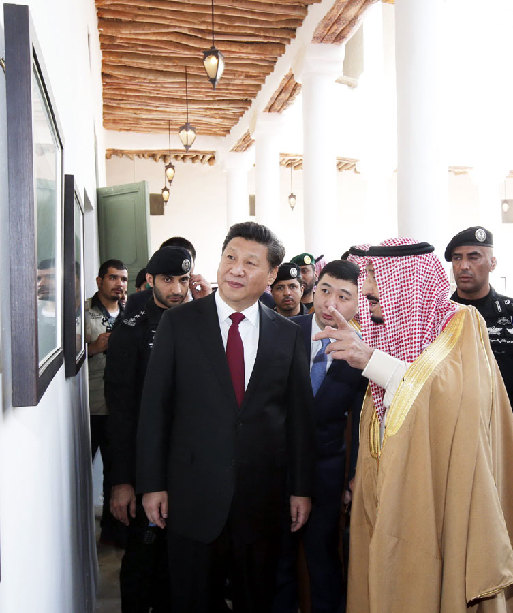Xi's visit a reflection of China's commitment to Middle East peace
- By He Wenping
 0 Comment(s)
0 Comment(s) Print
Print E-mail China.org.cn, January 24, 2016
E-mail China.org.cn, January 24, 2016
|
|
|
Chinese President Xi Jinping has a taste of traditional Arab culture Wednesday as he visits the historic Murabba' Palace in Riyadh. [Photo/Xinhua] |
In Chinese President Xi Jinping's 2016 New Year speech, he mentioned that "the world is too big, and the challenges are too many to go without China's voice being heard, without solutions from China being shared and without the involvement of China being necessary." While people are still musing on the deeper meaning of the sentence, Xi has already rolled out his first overseas visit this year to Saudi Arabia, Egypt and Iran.
His visit comes at a time when the conflict between Iran and Saudi Arabia became acute and the flames of war swept through Syria. As a result, the visit has drawn the attention of the international community.
The Middle East is located in the junction of Europe, Asia and Africa. The region is at a crucial period of social transition and political reconstruction. Given its strategic location and resources, the political situation in the region and its relations with other countries has grown increasingly complex in recent years. For a long time, the United States and the European Union were the most influential outside powers in the region. In recent years, with Russia's military involvement in Syria and the high-profile fight against the Islamic State, Russia, under President Vladimir Putin, began to return to the Middle East from military standpoint.
China is a latecomer in Middle Eastern affairs. However, because of the neutrality, objectivity and impartiality of China's foreign policy, and its commitments toward economic development, reconstruction efforts and humanitarian assistance in the region, China has never been absent in Middle Eastern affairs. In recent years, China has taken on an even more proactive stance in its Middle Eastern diplomacy to promote regional peace and stability.
Taking the Israeli-Palestinian conflict as an example, the Chinese government invited Palestinian President Mahmoud Abbas and Israeli Prime Minister Benjamin Netanyahu to visit China separately in May 2013. President Xi met with the two leaders in person to mediate the conflicts and put forward a four-point proposal to outline China's attitude towards Israeli-Palestinian conflict. China clearly reaffirmed the four-point proposal in its recently issued Arab Policy Paper on Jan. 13, saying that "China supports the Middle East peace process and the establishment of an independent state of Palestine with full sovereignty, based on the pre-1967 borders, with East Jerusalem as its capital. China supports the Arab League and its member states' efforts to this end."




Go to Forum >>0 Comment(s)